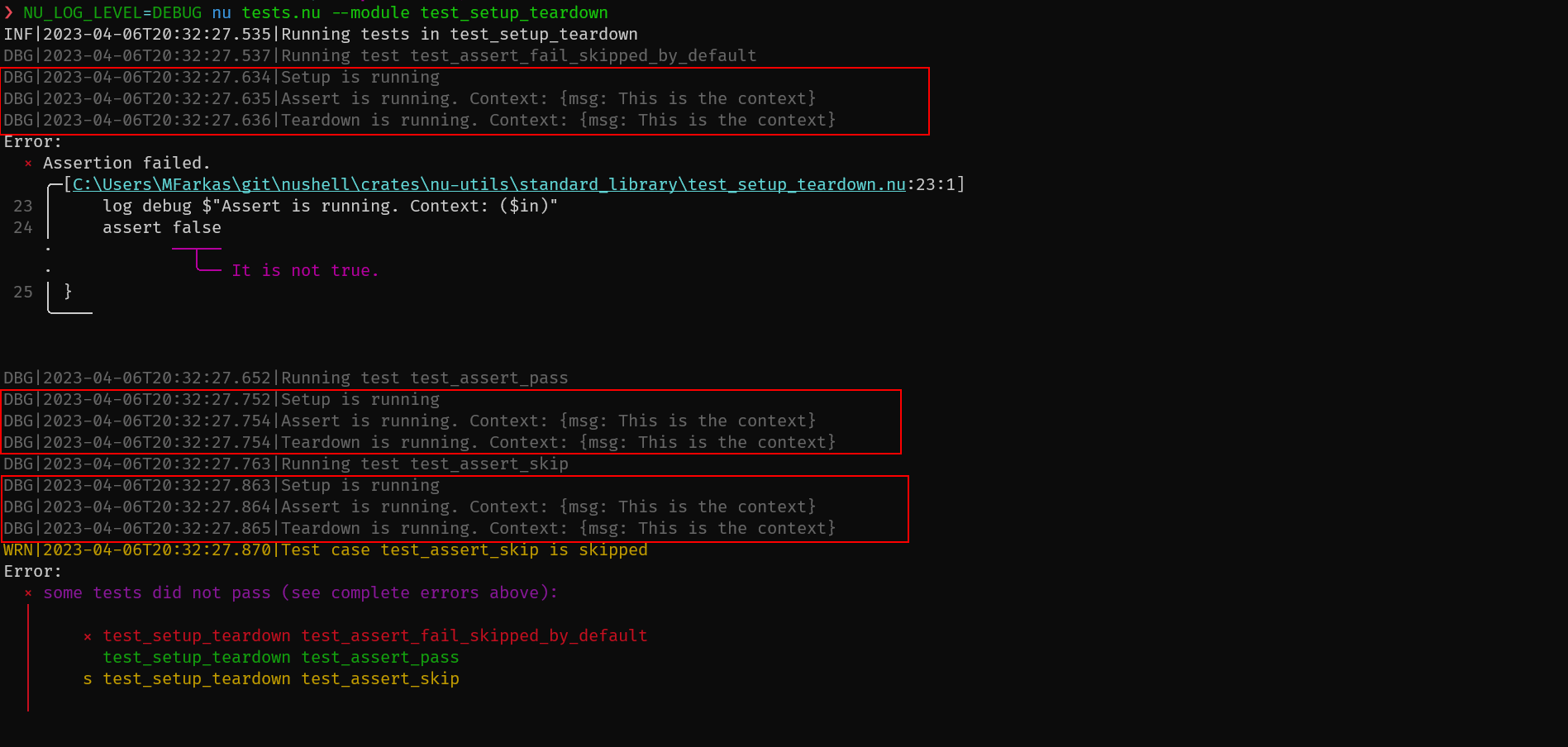# Description
When the directory stack contains only two directories, then std dirs
drop
used to misbehave and (essentially) drop the other directory, instead of
dropping the current directory.
This is fixed by always cd'ing for std dirs drop.
Before:
/tmp〉enter ..
/〉dexit
/〉
After:
/tmp〉enter ..
/〉dexit
/tmp〉
Additionally, I propose to explain the relevant environment variables a
bit
more thoroughly.
# User-Facing Changes
- Fix bug in dexit (std dirs drop) when two directories are remaining
# Tests + Formatting
Added a regression test. Made the existing test easier to understand.
# Description
Test runner now performs following actions in order to run tests:
* Module file is opened
* Public function with random name is added to the source code, this
function calls user-specified private function
* Modified module file is saved under random name in $nu.temp-path
* Modified module file is imported in subprocess, injected function is
called by the test runner
# User-Facing Changes
<!-- List of all changes that impact the user experience here. This
helps us keep track of breaking changes. -->
* Test functions no longer need to be exported
* test functions no longer need to reside in separate test_ files
* setup and teardown renamed to before-each and after-each respectively
* before-all and after-all functions added that run before all tests in
given module. This matches the behavior of test runners used by other
languages such as JUnit/TestNG or Mocha
# Tests + Formatting
# After Submitting
---------
Co-authored-by: Kamil <skelly37@protonmail.com>
Co-authored-by: amtoine <stevan.antoine@gmail.com>
related to the namespace bullet point in
- https://github.com/nushell/nushell/issues/8450
# Description
this was the last module of the standard library with a broken
namespace, this PR takes care of this.
- `run-tests` has been moved to `std/mod.nu`
- `std/testing.nu` has been moved to `std/assert.nu`
- the namespace has been fixed
- `assert` is now called `main` and used in all the other `std assert`
commands
- for `std assert length` and `std assert str contains`, in order not to
shadow the built-in `length` and `str contains` commands, i've used
`alias "core ..." = ...` to (1) define `foo` in `assert.nu` and (2)
still use the builtin `foo` with `core foo` (replace `foo` by `length`
or `str contains`)
- tests have been fixed accordingly
# User-Facing Changes
one can not use
```
use std "assert equal"
```
anymore because `assert ...` is not exported from `std`.
`std assert` is now a *real* module.
# Tests + Formatting
- 🟢 `toolkit fmt`
- 🟢 `toolkit clippy`
- ⚫ `toolkit test`
- ⚫ `toolkit test stdlib`
# After Submitting
```
$nothing
```
# Notes for reviewers
to test this, i think the easiest is to
- run `toolkit test stdlib` and see all the tests pass
- run `cargo run -- -n` and try `use std assert` => are all the commands
available in scope?
# Description
<!--
Thank you for improving Nushell. Please, check our [contributing
guide](../CONTRIBUTING.md) and talk to the core team before making major
changes.
Description of your pull request goes here. **Provide examples and/or
screenshots** if your changes affect the user experience.
-->
Fixes https://github.com/nushell/nushell/issues/9229.
Supersedes #9234
The reported problem was that `shells` list of active shells (a.k.a `std
dirs show` would show an inaccurate active
working directory if user changed it via `cd` command.
The fix here is for the `std dirs` module to let `$env.PWD` mask the
active slot of `$env.DIRS_LIST`. The user is free to invoke CD (or write
to `$env.PWD`) and `std dirs show` will display that as the active
working directory.
When user changes the active slot (via `n`, `p`, `add` or `drop`) `std
dirs` remembers the then current PWD in the about-to-be-vacated active
slot in `$env.DIRS_LIST`, so it is there if you come back to that slot.
# User-Facing Changes
<!-- List of all changes that impact the user experience here. This
helps us keep track of breaking changes. -->
None. It just works™️
# Tests + Formatting
<!--
Don't forget to add tests that cover your changes.
Make sure you've run and fixed any issues with these commands:
- `cargo fmt --all -- --check` to check standard code formatting (`cargo
fmt --all` applies these changes)
- `cargo clippy --workspace -- -D warnings -D clippy::unwrap_used -A
clippy::needless_collect -A clippy::result_large_err` to check that
you're using the standard code style
- `cargo test --workspace` to check that all tests pass
- `cargo run -- crates/nu-std/tests/run.nu` to run the tests for the
standard library
> **Note**
> from `nushell` you can also use the `toolkit` as follows
> ```bash
> [x] use toolkit.nu # or use an `env_change` hook to activate it
automatically
> toolkit check pr
> ```
-->
# After Submitting
<!-- If your PR had any user-facing changes, update [the
documentation](https://github.com/nushell/nushell.github.io) after the
PR is merged, if necessary. This will help us keep the docs up to date.
-->
# Description
As in other testing frameworks, the `setup` runs before every test case,
and the `teardown` after that. A context can be created in `setup`,
which will be in the `$in` variable in the test cases, and in the
`teardown`. The `teardown` is called regardless of the test is passed,
skipped, or failed.
For example:
```nushell
use std.nu *
export def setup [] {
log debug "Setup is running"
{msg: "This is the context"}
}
export def teardown [] {
log debug $"Teardown is running. Context: ($in)"
}
export def test_assert_pass [] {
log debug $"Assert is running. Context: ($in)"
}
export def test_assert_skip [] {
log debug $"Assert is running. Context: ($in)"
assert skip
}
export def test_assert_fail_skipped_by_default [] {
log debug $"Assert is running. Context: ($in)"
assert false
}
```

# After Submitting
I'll update the documentation.
---------
Co-authored-by: Mate Farkas <Mate.Farkas@oneidentity.com>